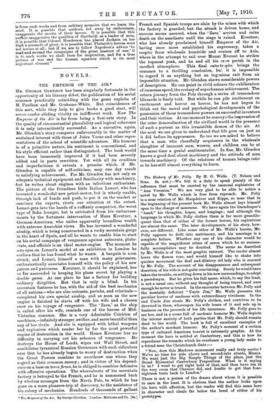The History of Mr. Polly. By H. G. Wells. (T.
Nelson and Sons. 2s. net.)—We felt it a duty to speak plainly of the influence that must be exerted by the immoral sophistries of "Ann Veronica." We are very glad to be able to notice a novel by Mr. Wells which is free from reproach. Mr. Polly is a near relation of Mr. Hoopdriver and Rippe, so near that in the beginning of the present book Mr. Wells almost lays himself open to the charge of sameness. We have again the linendraper's " hand," his thoughts, hopes, and longings ; and although the language in which Mr. Polly clothes them is far more grandilo- quent than that of either of the former heroes, his aspirations are almost the same. The later developments of his story, how- ever, are different. Like some other of Mr. Wells's heroes, Mr. Polly appears to drift into matrimony, and his marriage is a complete failure. Whether any one of his character would be capable of the magnificent crime of arson which he so success- fully accomplishes may be doubted. The scene as described by Mr. Wells is of the most graphic interest. The reader almost hears the flames roar, and would himself like to shake into quicker movement the deaf and dilatory old lady who is rescued by Mr. Polly. The account of his disappearance and subsequent desertion of his wife is not quite convincing. Surely he would have taken the trouble, on settling down in his new surroundings, to adopt a pseudonym. But he gives his full name, which, to say the least, is not a usual one, without any thought of being traced, and sure enough he never is traced. In the encounter between Mr. Polly and the mentally deficient " Uncle Jim," Mr. Wells presents the peculiar horror of madness with extraordinary vividness. In the end Uncle Jim steals Mr. Polly's clothes, and contrives to be drowned in them, whereupon his wife hears of it and sets up in business on the proceeds of his life insurance. Mr. Polly goes to see her, and in a scene full of sardonic humour Mr. Wells depicts the intense anxiety of both parties that Mr. Polly should remain dead to the world. The book is full of excellent examples of the author's mordant humour. Mr. Polly's account of a certain type of cultured American tourist is extremely graphic. At the moment the hero is settled at Canterbury, and this is how he reproduces the remarks which he overhears a young lady make to a friend near the Christchurch Gate:— "Now, does this Marlowe monument really and truly matter? We've no time for side shows and second-rate stunts, Mamie. We want just the Big Simple Things of the place, just the Broad Elemental Canterbury Preposition. What is it saying to us ? I want to get right hold of that, and then have tea in the very room that Chaucer did, and hustle to get that four- eighteen train back to London."
There is not a person of the drama about whom it is possible to care in the least. It is obvious that the author looks upon his hero with affection, but the reader will find this same hero in character and ideals far below the level of either of his










































 Previous page
Previous page